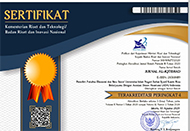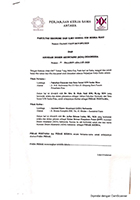REVITALIZATION OF ISLAMIC FINANCIAL INSTITUTIONS AND FINTECH INNOVATION: REALIZING PROSPERITY IN LOW-INCOME COMMUNITIES
Abstract
This study uses a qualitative approach and literature review method to explain related phenomena. The purpose of the study is to provide an overview of the role of Islamic financial institutions and fintech in overcoming poverty. Secondary data were obtained from related literature such as academic journals, books, articles, and other documents. The analysis method used is descriptive analysis with a focus on an in-depth understanding of the phenomenon. The results of the study illustrate that in the perspective of Islamic Economics, poverty is overcome through synergy between the government, Islamic financial institutions, and the community with a social development and empowerment approach. Islamic financial institutions play a key role in managing zakat and sadaqah funds, providing affordable financing, and focusing on community empowerment. FinTech, as a financial technology innovation, has the potential to distribute zakat efficiently, facilitate access to Islamic investment, and increase financial inclusion. However, challenges related to understanding, accessibility, and regulation still need to be overcome. Collaboration between Islamic financial institutions and fintech is expected to overcome these obstacles, create an inclusive financial ecosystem, and support the welfare of low-income communities. The implication of this study is that the integration of financial technology in Islamic financial institutions can make a positive contribution to poverty alleviation and improve community welfare.
Keywords
References
Adinugraha, H. H. (2021). Digitalisasi Lembaga Keuangan Syariah.
Aji, Ahmad Mukri, Harisah, and Syarifah Gustiawati Mukri. “Revitalization of Fintech Era 4.0 in the Development of Islamic Microfinance Institutions (IMFs).” Al-Iqtishad: Jurnal Ilmu Ekonomi Syariah 12, no. 1 (2020): 149–164.
Anwar, K., Hakim, L., Adinugraha, H. H., & Ma'shum, M. H. (2023). A Implementation of Information Technology at Sharia Insurance Institutions BSI Pekalongan. Journal of Islamic Management Studies, 6(1), 42-54.
Awwalunnisa, Nur. “Peran Lembaga Keuangan Syariah Dalam Pengentasan Kemiskinan Di Provinsi Nusa Tenggara Barat.” IQTISHADUNA 12, no. 1 (2021).
fahriyanto. “■ 文 / 刘 渊 1 齐彦民 2 1. 石家庄实验中学 2. 石家庄欧云电子科技有限公司” 2, no. 04 (2019): 61–65. https://www.biorxiv.org/content/10.1101/2020.03.06.976126v1.
Irma Muzdalifa, Inayah Aulia Rahma, Bella Gita Novalia. “( Pendekatan Keuangan Syariah ).” Jurnal Masharif al- Syariah:Jurnal Ekonomi dan Perbankan Syariah 3, no. 1 (2018): h. 1-24.
Irwan Suriadi. “Peluang Dan Tantangan Lembaga Keuangan Mikro Syariah (BMT) Dalam Mengurangi Kemiskinan Di Nusa Tenggara Barat.” Journal of Economics and Business 4, no. 1 (2018): 78–92.
Junadi, and Sfenrianto. “A Model of Factors Influencing Consumer’s Intention to Use E-Payment System in Indonesia.” In Procedia Computer Science. Vol. 59, 2015.
Miswan. (Tahun). Perkembangan dan Dampak Fintech terhadap Lembaga Keuangan Syariah di Jawa Tengah. Jakarta: Direktorat Pendidikan Tinggi Keagamaan Islam, Direktorat Jenderal Pendidikan Islam, Kementerian Agama RI.
Nurdin, S Titania. “Peran Lembaga Keuangan Mikro Syariah Terhadap Usaha Mikro Kecil Dan Menengah Dalam Mengatasi Kemiskinan.” Ekonomi Islam (2017).
Pratama, EPPA, A Choirunnisa, and ... “Peran Lembaga Keuangan Syariah Dalam Pengentasan Kemiskinan Di Indonesia.” Jurnal … 3 (2022): 570–577. http://journal.universitaspahlawan.ac.id/index.php/jkt/article/view/8150%0Ahttp://journal.universitaspahlawan.ac.id/index.php/jkt/article/download/8150/7917.
SUADI, AMRAN. “Peluang Dan Tantangan Lembaga Keuangan Syariah Dalam Menghadapi Era Pasar Bebas / Opportunities and Challenges of Sharia Financial Institutions in Dealing With Free Market.” Jurnal Hukum dan Peradilan 7, no. 1 (2018): 1.
Sutan Efendi, Pinky. “Peluang Dan Tantangan Fintech Syariah Dalam Mendorong Perekonomian UMKM Masyarakat Kediri.” COMSERVA Indonesian Jurnal of Community Services and Development 2, no. 5 (2022): 373–382.
DOI: http://dx.doi.org/10.24014/jiq.v20i2.26780
Refbacks
- There are currently no refbacks.















